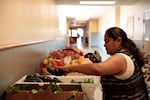
In this undated photo provided by the Oregon Food Bank, volunteer and food bank recipient Maria A. Rojas-Mendoza picks up vegetables at the Free Food Market run by Oregon Food Bank at Earl Boyles Elementary School. Last year, 2.5 million people visited free food sites in Oregon and southwest Washington last year, a 31% increase from the year before.
Melissa Farlow / Courtesy of Oregon Food Bank and Melissa Farlow
UPDATE: After publication on Friday, the U.S. House of Representatives passed a short-term government spending plan. The plan will go to the U.S. Senate for approval.
Thousands of Oregonians who rely on federal benefits could be at risk of facing hunger if Congress does not reach an agreement on a bill to fund the government by the end of the day Friday.
Regional food bank operators say a shutdown might prompt a surge of people needing food services. While Social Security and veterans’ benefits would still be processed in a shutdown, some programs could see delays as furloughs commence and federal employee pay comes to a halt.
That could increase the strain on food banks at a time when the number of people seeking food services is increasing far above pre-pandemic levels.
“This didn’t used to be how we did things,” Scott Cooper, the executive director of NeighborImpact, which provides anti-poverty services in Central Oregon, said of the shutdown.
“This is a phenomenon of the last, I don’t know, 15 years, when suddenly we use shutdown as a weapon and a tool,” he said. “It’s bad management in everybody’s mind. It has no political advantage.”
The potential shutdown comes at a dire moment for those in need across Oregon: People visited free food sites 2.5 million times in Oregon and Southwest Washington last year, a 31% increase from the year before, according to the Oregon Food Bank.
“The rising cost of food and housing is forcing our communities to choose between paying rent and health care bills and putting food on the table,” said food bank spokesperson Morgan Dewey. “And all the data we’re seeing come out just points to the fact that we were in a crisis. We’re in an ongoing hunger crisis, and it’s not really slowing down unfortunately.”
Providers say they are prepared to handle the surge in services if the government shuts down and noted that the state has set aside funding that would buoy programs for the nearly 770,000 Oregonians using SNAP — formerly known as food stamps — and the 79,000 using WIC programs, which supports women, infants and children.
“We have lived through several government shutdowns, and I can’t say that we were overly impacted,” said Paula Hall, the chief executive officer of CAPECO, which provides social services throughout Eastern Oregon, including a food bank. “But certainly, you feel the crunch. We’ll do whatever we can: We’ll have a bake sale if we have to, to get people’s needs met.”
Still, the food bank is anticipating an increase in people visiting their sites if the government shuts down.

Many Oregonians continue to face food insecurity.
Courtesy of Oregon Food Bank
“A prolonged shutdown definitely worsens hunger for tens of thousands and more community members through missed paychecks, suspension of vital programs,” said Dewey. “We’re really hoping for a short shutdown … We don’t expect an immediate cutoff of those programs to our communities. But we also know that, unless we can count on the federal government to find a solution soon, those programs will be interrupted.”
In 2019, NeighborImpact, which operates in Deschutes, Crook and Jefferson counties, would serve more than 14,000 people through its food bank each month. Now it serves about 73,000, using roughly 4.5 million pounds of food each year. And in Eastern Oregon, CAPECO last year provided about 970,000 “units,” each with about three to five days worth of food.
Increasingly, Cooper said, the people seeking help are those the group has never assisted before, including people who are struggling to pay rent due to the high cost of housing.
“We have gotten, unfortunately, pretty used to preparing for government shutdowns in the last decade,” Cooper said, but NeighborImpact is “in a position where most of our services would continue without interruption for a short term, and we have reserves put aside in order to be able to cushion against any impact.”
In previous government shutdowns, the impact worsens as time and paydays pass, with additional federal employees and contractors, as well as recipients of Social Security and veterans benefits, seeking help as federal funds dissipate. There are at least 19,000 federal workers in Oregon, according to a September Congressional Research Service report.
Government shutdowns can have ripple effects. Government benefits programs can often take time to get fully back online following shutdowns, leaving some people struggling for days, if not weeks, to get their benefits, Cooper said.
Meanwhile, groups like NeighborImpact have to slow down services, such as housing assistance, Cooper said. He added, “That means that we have to become the government banker, and we have to use our reserves to keep those vital programs running because rents are due, whether the government is shut down or not.”
“Every single time we have a shutdown, the ruling party at that time wishes they hadn’t done it afterwards,” said Cooper. “What is the matter with these people? Is there no institutional memory whatsoever? Do they never learn?”
President-elect Donald Trump and his advisers, including Elon Musk and Vivek Ramaswamy, came out against a bipartisan bill this week that would have provided billions of dollars towards disaster aid, farm subsidies, and a raise for lawmakers. The bipartisan deal was needed to fund the government by the end of the day Friday.
Republicans initially backed out of the deal but reached a new plan with Trump’s blessing and the support of House Speaker Mike Johnson on Thursday, but that plan failed after some Republicans joined Democrats in opposing it.
Oregon’s congressional delegation mostly voted along party lines on that latest bill. Republicans Cliff Bentz and Lori Chavez-DeRemer voted for the bill. Democrats Suzanne Bonamici, Val Hoyle and Andrea Salinas voted against it. Earl Blumenauer did not vote, and Southwest Washington Democrat Marie Gluesenkamp Perez joined the majority of House GOP members in voting for it.
Congress had yet to reach a deal as of Friday afternoon.
Those seeking food sites can find them at oregonfoodfinder.org
“Right now food is still available,” said Dewey, of the food bank. “But I do think that this is a call to action for our communities, that we need a government that works for us. We need a government that we can fully participate in. We know that we cannot end hunger with food alone.”
